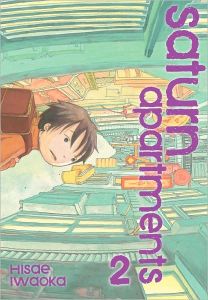 I read the second volume of Hisae Iwaaka’s Saturn Apartments (Viz) last night, confirming my feeling that this is one of the best new series of the year. (I feel that way about several titles in Viz’s SigIKKI program, but which one of them I like best depends on which one I’ve read most recently.) For those who need a refresher, this is slice-of-life science fiction about the people who wash windows on a satellite habitat orbiting an environmentally devastated Earth.
I read the second volume of Hisae Iwaaka’s Saturn Apartments (Viz) last night, confirming my feeling that this is one of the best new series of the year. (I feel that way about several titles in Viz’s SigIKKI program, but which one of them I like best depends on which one I’ve read most recently.) For those who need a refresher, this is slice-of-life science fiction about the people who wash windows on a satellite habitat orbiting an environmentally devastated Earth.
Though episodic in a lot of ways, it does follow a single protagonist, Mitsu, who is following in his late father’s footsteps in a perilous, under-appreciated profession. Mitsu spends a significant portion of this volume considering his father’s legacy, or perhaps trying to construct what that legacy might look like. He talks to his father’s co-workers, now his co-workers, about how his father approached his work and, less directly, how he might have felt about it. As a neophyte, he’s also asking about the specifics of a dangerous job he still hasn’t mastered, so there’s an extra layer of intention in the question-and-answer sessions.
I enjoy series that have a strong grounding in a particular profession, whether that profession is realistic or fanciful. The grubby-fantastic quality that Iwaaka gives to her cast’s working world is very appealing to me, and I like the ways she resists canonizing her characters as salt-of-the-earth types. While she draws them in an innocent, vulnerable style, she writes them with a bit more frankness. The get cranky, hold grudges, drink too much, work too hard, get careless… they behave credibly and recognizably, in other words.
 Other noteworthy items on this week’s ComicList include the 9th volume of Takehiko Inoue’s extraordinarily good Real (Viz). Melinda (Manga Bookshelf) Beasi named it her Pick of the Week, because she has excellent taste that way.
Other noteworthy items on this week’s ComicList include the 9th volume of Takehiko Inoue’s extraordinarily good Real (Viz). Melinda (Manga Bookshelf) Beasi named it her Pick of the Week, because she has excellent taste that way.
 The other highlight of the week has to be the second collection of Linda Medley’s Castle Waiting (Fantagraphics). The publisher describes the comics as “witty and sublimely drawn fantasy [that] eases into a relaxed comedy of manners,” which is perfectly true. It’s really a treat of a series, one that I bought in pamphlet form and will buy in its collected state, which almost never happens.
The other highlight of the week has to be the second collection of Linda Medley’s Castle Waiting (Fantagraphics). The publisher describes the comics as “witty and sublimely drawn fantasy [that] eases into a relaxed comedy of manners,” which is perfectly true. It’s really a treat of a series, one that I bought in pamphlet form and will buy in its collected state, which almost never happens.
What looks good to you?




















